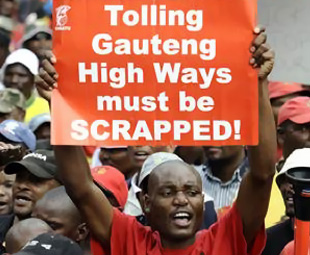E-tolls crumble under pressure

All we want for Christmas is no e-tolls. And thanks to those who give a voice to the voiceless, it looks like this is what we might get!
The controversial Transport Laws and Related Matters Amendment Bill (aka the e-toll bill), was withdrawn from debate from the National Assembly order paper last Thursday (November 22).
Shortly after the assembly convened on Thursday afternoon the African National Congress (ANC) asked for two resolutions, essential to implement e-tolling, to be withdrawn.
Astonishingly the house agreed to the request with no reasons given. However, this might not mean a cause for celebration just yet as the bill hasn’t been withdrawn for good – the matter has only been delayed for discussion.
In a statement made thereafter, Democratic Alliance (DA) spokesperson, Ian Ollis said that pressure from the opposition parties pushed the ANC to withdraw.
Ollis adds: “After a call by DA chief whip, Watty Watson, which was supported by other parties and a threat from the opposition to stage a walkout during the debate on the e-toll bill, the ANC withdrew.”
This means that Gauteng e-tolls won’t be “the anticipated lump of coal in Christmas stockings this year”, as Ollis phrases it.
He tells FOCUS that the committee’s deliberations on the bill will continue into next year. “It will only be considered when parliament reconvenes on February 10 next year.” He stresses that the DA will be monitoring the situation closely to ensure all proper processes are followed when the bill is considered by parliament next year.
“This is indeed a victory for opposition parties and the South African public,” continues Olli.
The South African Chamber of Commerce and Industry (Sacci) has also welcomed the hold on legislation. CEO of Sacci, Neren Rau, says: “The withdrawal and delay in adopting a final position on the e-toll system reflects on the political sensitivity of the issue.”
According to Rau, the grievances aired against the e-toll system are in large part due to the lack of transparency and disregard for proper procedure. “The fact that a substantial percentage of the e-toll fees would go to the administrative cost of the system is unacceptable,” the Sacci CEO notes.
Rau says that an equitable way must be found to finance the improvements to the roads when the debate resumes in February next year.
Meanwhile the Congress of South African Trade Unions (Cosatu) has decided to place its pressure on government in a more drastic approach. Cosatu has called on the public and other political parties to show their support against e-toll implementation by joining in various forms of protest action, starting on November 30 and continuing until December 7.
Despite the recent halt on e-toll implementation, the trade union will go ahead with demonstrations in a bid to gain support against open road tolling.
Supporters will gather in Johannesburg and Tshwane on tomorrow (Friday, November 30) and will march to the Department of Transport, Department of Finance and to the Department of Housing and Local Government to hand over memorandums, marking the start of the eight-day protest action.
National spokesperson for Cosatu, Patrick Craven, says: “There is mass opposition to open road tolling in Gauteng and government must take this into account. Government must prioritise the roll-out of efficient, reliable, affordable and safe transport for all the people of South Africa.”
Craven reveals that Cosatu has a series of motivations as to why it refuses to support e-toll implementation. Burdening the poor, perpetuating exclusion, privatisation, cost of collection and the fact that income of the system is to be supplemented by collecting fines are among the valid reasons the union opposes e-tolling.
The Inkatha Freedom Party Gauteng Province (IFPGP) has joined the likes of Cosatu in reiterating its disagreement regarding the pending implementation of e-tolling.
IFPGP caucus leader in the Gauteng Provincial Legislature (GPL), Bonginkosi Dhlamini, says: “The situation has been disappointing. Last year the IFPGP cautioned in the GPL that, in dealing with implementation of e-tolling, there must be a strong consideration for people’s will. This seems to have fallen on deaf ears and is continually overlooked.”
He asks: “Can we honestly make it any more clear that we don’t want this e-tolling project to persist? We are not insane but rather fed up with the ruling party’s lack of sympathy towards the voices of the masses.”
Dhlamini acknowledges that it has been a tough financial year. “In light of the current economic tensions in South Africa, it is absurd and unjust to expect already pressed citizens to pay to use roads they already fork out for via indirect tax.”
Published by
Focus on Transport
focusmagsa




